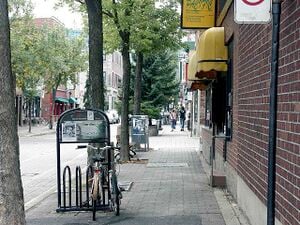
This article is an offshoot of our Montreal community action page
Funding[edit | edit source]
La Ruche[edit | edit source]
La Ruche — "The Hive" — is a Quebec-only crowdfunding platform run by a nonprofit. All projects are reviewed by a selection committee and only allowed to solicit funds if they will have a "positive social, economic, or cultural" impact on their community. At regional meetings, known as "cellules," participants get a chance to pitch their project to public figures who are well-known and well-connected in the fields of social justice, business, and the performing arts. Workshops, part of the La Ruche Académie program, help promoters refine their pitches. La Ruche stands out for its nonprofit structure, one-on-one assistance for participants, and regional outlook. Some current projects that are being funded by La Ruche Montréal include the production of choral music in Braille, subsidized self-defense courses for children, and an independent, zero-waste organic grocery startup.[1]